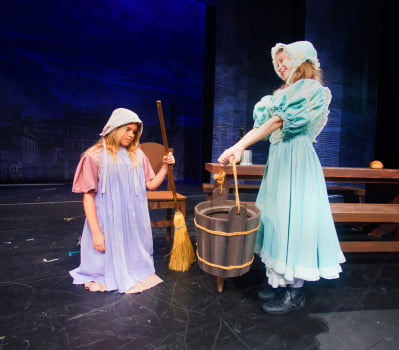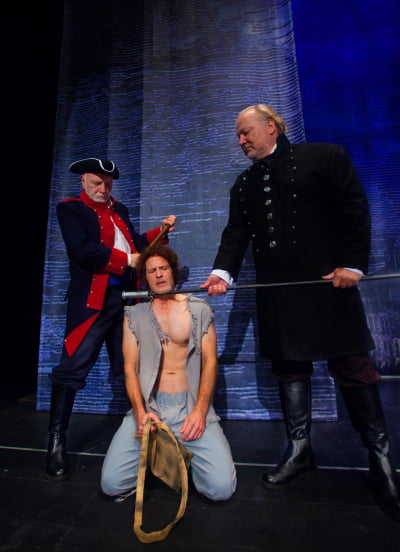The effort to bring Cameron McIntosh’s legendary production and global stage sensation, “Les Miserables” to the Ocala Civic Theatre is almost as epic as the novel, play and film of the tale itself. Executive director of the OCT, Mary Britt said their audiences have asked for the play for years when they surveyed the patrons asking them what they would like to see. She decided to run “Les Miserables”, known as Les Mis, now because it is one of the most popular, biggest productions of all time on Broadway, and the rights that have been restricted for local groups, regional/community theatres and school groups were not available until now.
 The company that licenses the show, Music Theatre International, contacted Britt, telling her that the show would be available. The advance notice was given because of the long-established relationship with the OCT.
The company that licenses the show, Music Theatre International, contacted Britt, telling her that the show would be available. The advance notice was given because of the long-established relationship with the OCT.
Set in 19th-century France, Les Mis is a story of broken dreams, unrequited love, passion, sacrifice, and redemption, a testament of the survival of the human spirit. Written as a novel by Victor Hugo and first published in 1862, “Les Miserables” inspired an award-winning Broadway musical in 1987 and a box office smashing, award-winning film in 2013.
Both the play and the film had the dialogue sung throughout with 50 memorable songs including “I Dreamed a Dream,” “Bring Him Home,” “One Day More,” “On My Own” and “Do You Hear the People Sing?” Local “Les Mis” Director Jim Sohre, who has worked in theatre for more than 33 years, said our local audiences can look forward to a well-done production with some great tunes that they are familiar with sung by a highly talented cast.
When Britt announced around town that the OCT would produce “Les Mis,” the reaction was a mixture of enthusiasm and skepticism. It is a major production to pull off; many wondered: could it be done in community theatre?
“The beauty of this show is that it is doable by community theatres. It wasn’t based on technical achievement, it was based on the writing and the heart of the story,” Sohre said.
“All of the dialogue is sung, so there are some very interesting, almost dissonant, musical stings and accents and punctuations. They [the audience] will take with them some nice music really grounded in musical theatre … [and] will care about the characters through good melodies and real heart that is in the music.”
Due to the magnitude of the musical, however, the OCT had to make a number of accommodations to produce the show. It runs longer because they are anticipating that a larger audience will see this more than any other show they have ever done before. That meant OCT needed to carefully pick the two shows that followed “Les Mis,” so that they could fit six weeks into the calendar. A show usually runs four weeks.
are anticipating that a larger audience will see this more than any other show they have ever done before. That meant OCT needed to carefully pick the two shows that followed “Les Mis,” so that they could fit six weeks into the calendar. A show usually runs four weeks.
OCT also needed to change their schedule because they customarily do two shows on Saturday, but this show is vocally very demanding and it is longer than the regular shows. Thus, there are no dates where the cast is asked to do two performances in one day, which necessitated holding the show for two additional weeks.
For the OCT, the biggest challenge of producing such a large musical play was the time commitment of the volunteer cast and crew. It is almost three months of commitment. Many have risen to the challenge. They stated that, for the opportunity to perform in “Les Mis,” they would go the extra mile.
The heart is on the connection to the characters and the journey that each one of them takes. For the 200 members of the cast and crew, it is simply too big to pass up and too big to pass up for theatre lovers as well.






